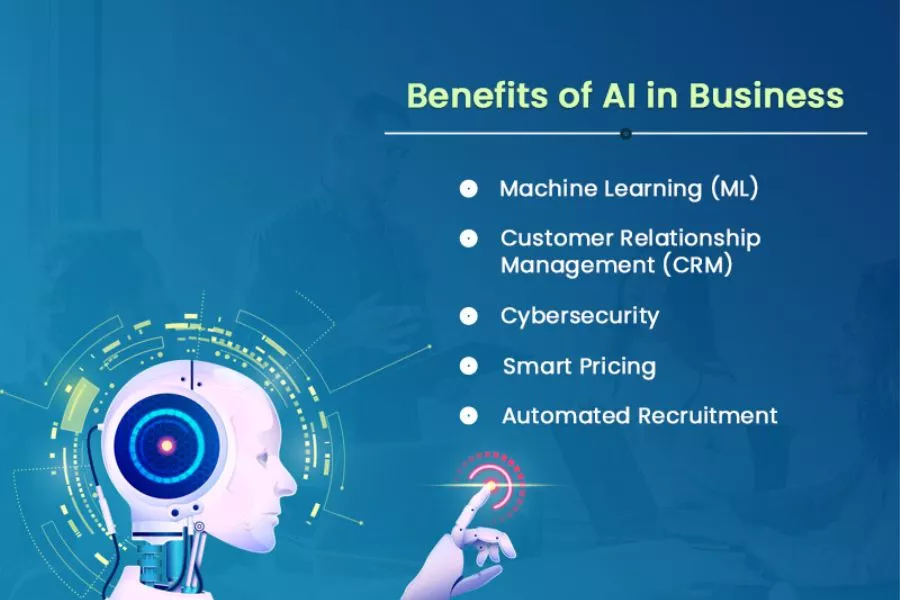Exploring the Benefits of AI in Business Operations

Benefits of AI in Business
Artificial Intelligence (AI) has become a game-changer for businesses across industries. From automating repetitive tasks to enhancing customer experience, AI has transformed the way businesses operate. In this article, we will explore the various applications of AI in business operations and the benefits it offers to organizations of all sizes. We will also address concerns about AI in business operations and provide insights on how to implement AI in your business.
Examples of AI in Business Operations
AI has a wide range of applications in business operations, and its use is not limited to any particular industry. Here are some examples of how AI is being used in different industries:
1. Healthcare: AI is being used in healthcare to improve the accuracy of diagnoses, predict patient outcomes, and develop personalized treatment plans. AI-powered chatbots are also being used to assist patients with their queries and provide them with basic healthcare information.
2. Retail: AI is being used in retail to optimize inventory management, improve customer service, and personalize the shopping experience. AI-powered chatbots are also being used to provide customers with product recommendations and assist them with their purchases.
3. Finance: AI is being used in finance to automate repetitive tasks, such as data entry and analysis, and to detect fraudulent activities. AI-powered chatbots are also being used to assist customers with their banking queries and provide them with personalized financial advice.
Benefits of AI in Business Operations
The benefits of AI in business operations are numerous and can help organizations achieve their goals more efficiently and effectively. Here are some of the key benefits of using AI in business operations:
Improving Efficiency with AI
One of the primary benefits of AI in business operations is improved efficiency. AI can automate repetitive tasks, such as data entry and analysis, allowing employees to focus on more complex and creative tasks. This can help businesses reduce the time and resources required to complete tasks, ultimately leading to increased productivity and profitability.
AI can also help businesses make better decisions by providing them with insights based on data analysis. By analyzing large amounts of data, AI algorithms can identify patterns and trends that humans may not be able to detect. This can help businesses make more informed decisions and improve their overall operations.
Enhancing Customer Experience with AI
Another major benefit of AI in business operations is enhanced customer experience. AI-powered chatbots can provide customers with instant support and assistance, improving their overall experience with the business. This can help businesses build stronger relationships with their customers and increase customer loyalty.
AI can also help businesses personalize their marketing and sales efforts, which can lead to higher conversion rates and increased revenue. By analyzing customer data, AI algorithms can identify customer preferences and behavior patterns, allowing businesses to tailor their marketing and sales efforts to specific customer segments.
Reducing Costs with AI
AI can also help businesses reduce costs by automating repetitive tasks and streamlining operations. By automating tasks such as data entry and analysis, businesses can reduce the time and resources required to complete these tasks manually. This can lead to significant cost savings, especially for businesses that rely heavily on data analysis.
AI can also help businesses reduce the risk of errors and fraud. By detecting anomalies and patterns in data, AI algorithms can identify potential fraudulent activities and alert businesses to take action. This can help businesses avoid financial losses and reputational damage.
Opportunities for Growth with AI
AI can also help businesses identify new opportunities for growth. By analyzing customer data and market trends, AI algorithms can identify areas of potential growth and help businesses develop new products and services. This can help businesses stay ahead of the competition and expand their market share.
AI can also help businesses identify areas where they can improve their operations. By analyzing data on customer complaints, for example, AI algorithms can identify areas where businesses can improve their customer service and make changes to their operations accordingly.
Addressing Concerns about AI in Business Operations
Despite the many benefits of AI in business operations, there are also concerns about its use. One concern is the potential impact of AI on employment. As AI continues to automate tasks that were once performed by humans, there is a risk that many jobs will become redundant.
Another concern is the potential for AI to be used in unethical ways. For example, AI algorithms could be used to discriminate against certain groups of people or to invade individuals’ privacy.
To address these concerns, it is essential for businesses to develop ethical guidelines for the use of AI. This includes ensuring that AI is used in a responsible and transparent manner, and that its impact on employment and society is carefully considered.
Implementing AI in Your Business
Implementing AI in your business can be a complex process, but there are several steps you can take to ensure a successful implementation. Here are some key steps to consider:
1. Identify the areas where AI can be most beneficial: Before implementing AI, it is important to identify the areas where it can add the most value to your business operations. This could include automating repetitive tasks, improving customer service, or identifying new opportunities for growth.
2. Choose the right AI solution: There are many AI solutions available, each with its own strengths and weaknesses. It is important to choose the solution that best fits your business needs and budget.
3. Develop a plan for implementation: Implementing AI requires careful planning and coordination. It is important to develop a detailed plan that outlines the steps involved in implementing AI, including training employees and integrating the AI solution into existing systems.
4. Monitor and evaluate the impact of AI: Once AI has been implemented, it is important to monitor its impact on your business operations. This includes tracking key performance indicators and evaluating the benefits and drawbacks of using AI.
Conclusion
AI has become an essential tool for businesses of all sizes, offering numerous benefits and opportunities for growth. From automating repetitive tasks to improving customer experience, AI has transformed the way businesses operate. While there are concerns about its use, businesses can address these concerns by developing ethical guidelines for the use of AI. By implementing AI in a responsible and transparent manner, businesses can leverage its power to take their operations to the next level.









